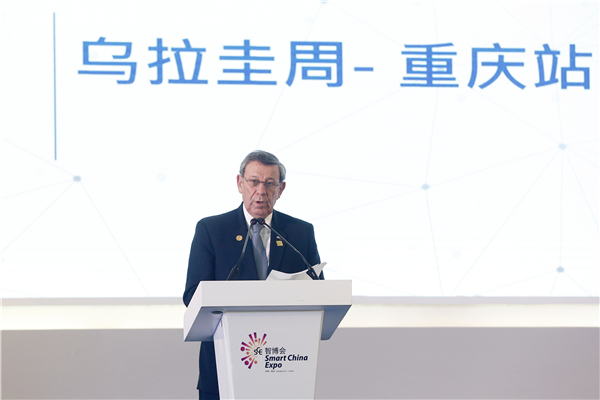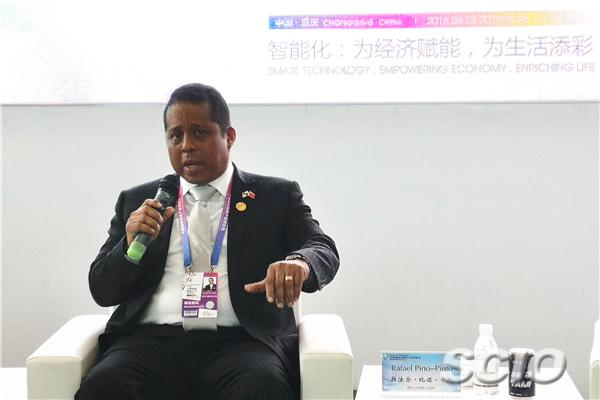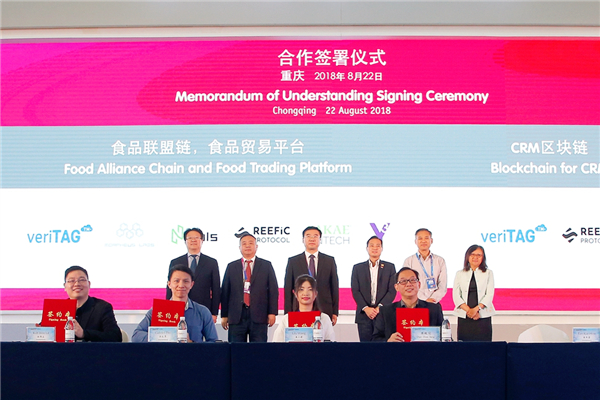Belt and Road Initiative 5 years on: Vigorous progress underway
Continuous efforts and vigorous progress have been underway since the Belt and Road Initiative was proposed by Chinese President Xi Jinping five years ago.
By Zhang Jiaqi
When the 2018 Smart China Expo opened in Chongqing on Aug. 23, over 30 foreign politicians and high-ranking officials attended the event, working to extend bilateral cooperation in various fields in this critical city along the Belt and Road routes.

Uruguay in Latin America is one of the many countries that sought more cooperation opportunities at the event.
"We are surprised to see that Uruguayan goods and services exported to China are becoming increasingly diversified, and look forward to seeing this trend continue," said Rodolfo Nin Novoa, foreign minister of Uruguay, at a promotion event held on Aug. 23 during the expo.
He proposed that China and Uruguay can strengthen cooperation in various fields, including infrastructure, animal husbandry, logistics, design, information and communication technology, company service, education, tourism and even football.
This year marks the 30th anniversary of the establishment of diplomatic relations between China and Uruguay. And just days ago, the two countries also signed a memorandum of understanding on the Belt and Road Initiative (BRI) in Beijing.
According to Rodolfo Nin Novoa, China and Uruguay have maintained stable relations in the past 30 years, and all Uruguayan governments have recognized the strategic significance of China in the economic and social development of Uruguay.
He said that some Chongqing companies have set up shops in Uruguay, like Lifan Group, which assembles automobiles in San Jose, Uruguay.
Mou Gang, president of Lifan Group, said it is the only company in Uruguay that has its own plants for automobile assembly and engine building, which elevated the whole automobile industry of Uruguay.
According to him, the company exports motors and cars to over 120 countries and regions, and ranks among the top three in the export volume of China's automobiles. In Uruguay, the Lifan 620 car model is a star among local taxis with its sales volume accounting for 23 percent of the total sales volume of taxis in the Uruguayan capital.
"Due to the huge influence of Lifan, the locals can pronounce the Chinese phonetic alphabet 'li fan,' and even use it as ‘hello’ to greet others," Mou said.
Highlighting that Uruguay is an extraordinary logistics point for the BRI, and an important and secure platform for Chinese companies to enter Latin American markets, the minister said he believes more Chinese companies will settle down in Uruguay.
"Right now, and in the future, Uruguay and China have endless potential to complement each other's advantages, which will help to effectively upgrade bilateral ties," he added.
Rafael Pino-Pinto, governor of Panama province in Panama, was also present at the expo, as a representative of a friendly city of Chongqing.

China and Panama established diplomatic relations in June last year. Five months later, during Panamanian President Juan Carlos Varela's visit to China, Panama and China signed a memorandum to jointly promote the BRI.
With a friendly cities agreement signed during the expo, Rafael Pino-Pinto said in a roundtable meeting that he expects more cooperation and exchanges between the two sides in intelligence, trade, culture and other areas.
The BRI connects the world, and every country and every person can achieve economic benefits from the initiative, the governor said.
He introduced the advantages of his country, saying that the Republic of Panama connects Central America and Caribbean countries, allowing a country with only 400,000 people to open up to a market with 600 million people. He also said that China is the second largest user of the Panama Canal.
For bilateral cooperation, he said China can learn about logistics from Panama, and that since artificial intelligence research in Panama just started, there are many things that Panama can learn from China in this field. He added that the expo came at exactly the right time, especially when the world is transforming from the information era to the intelligent era.
As the guest of honor of the expo, Singapore in Southeast Asia sent a delegation of over 40 companies to Chongqing, the largest ever delegation to China led by the Info-communications Media Development Authority of Singapore (IMDA), according to Tan Kiat How, CEO of IMDA, at a press release event held on Aug. 22.
At the event, Singaporean and Chongqing companies signed a number of memorandums of understanding, covering products and services supported by blockchain, cloud technology and intelligent logistics.

"This is another firm step for the cooperation between the two sides," Tan said, adding that the expo is another excellent chance for Chinese and Singaporean companies, and even the whole South Asia, to reshape the ecosystem of information and communication technology.
China is now the largest e-commerce market in the world with over 40 percent of global transaction volume in this field, and one of the dominant forces across the world in the digital economy. Meanwhile, Singapore is a global center for scientific and technological innovation.
Citing these statistics, Tan highlighted that "companies across the world can see that Singapore and Chongqing have lots of room for cooperation, and Singaporean companies can draw on precious experience from companies in China and the world."
Tan also expressed his expectations for enhancing partnership between Singaporean companies and Chinese ones at the event to further carry forward the third interconnectivity project between Chinese and Singaporean governments.
The project was officially announced during the state visit of Chinese President Xi Jinping to Singapore in November 2015.
On Jan. 8, 2016, China's southwestern city of Chongqing became the operation center of the China-Singapore (Chongqing) Demonstration Initiative on Strategic Connectivity to pilot cooperation in fields ranging from financial services, aviation, transportation and logistics to information communications technology.
According to Li Qian, deputy secretary general of the Chongqing municipal government, over the past three years, the two sides have made various explorations in these four areas, and expanded their cooperation under this project into other fields like education and tourism.
Now, years later, the two sides have signed 118 cooperative projects involving a total of US$21.4 billion in trade and investment. With the joint efforts of the two sides, nearly 60 innovative policies have been implemented so far, he added.

